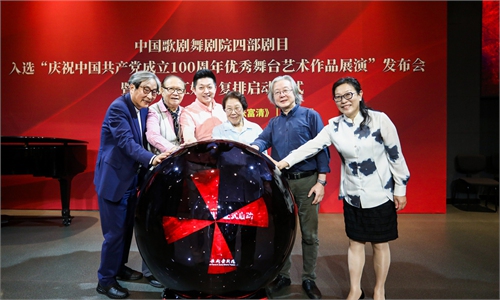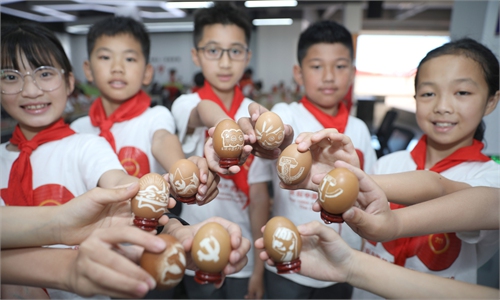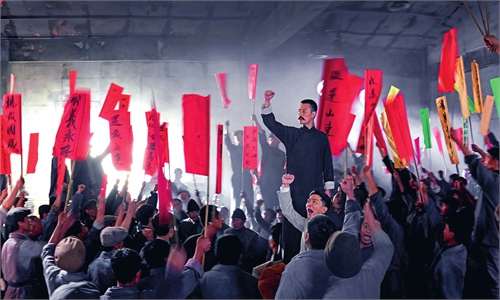Youth appreciate CPC history – in innovative ways – and strengthen faith in China's future
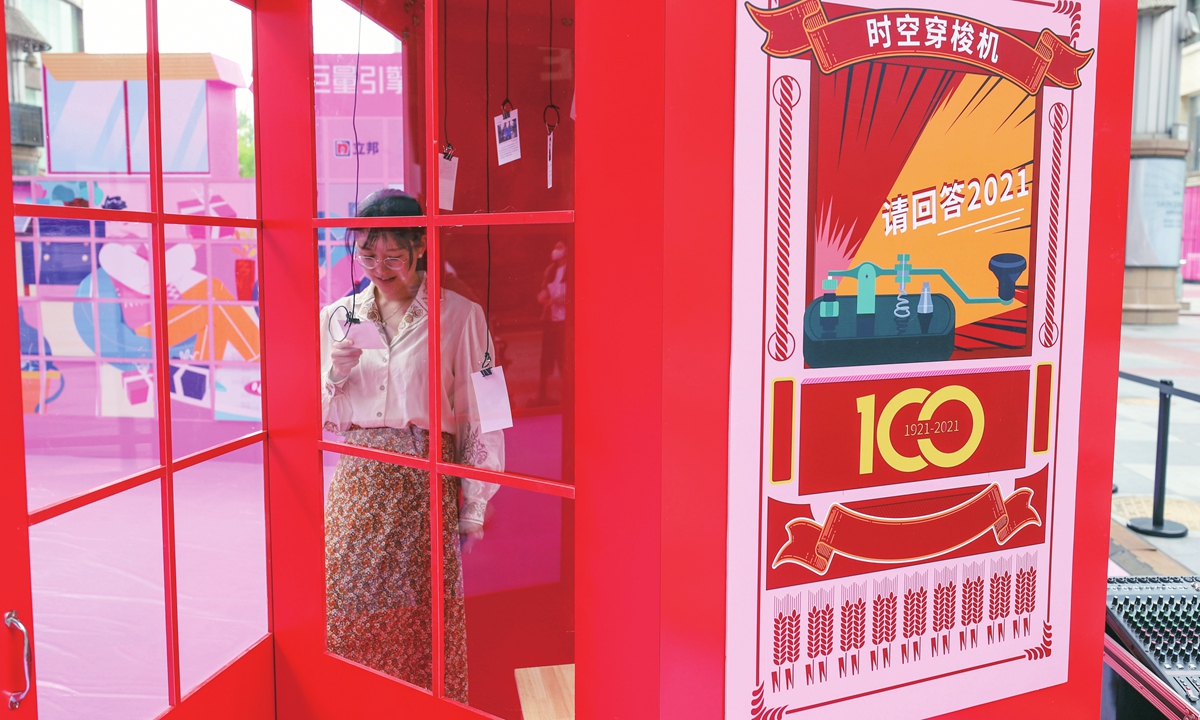
A woman reads the information card on CPC history in a "telephone booth," which allows visitors to "travel back in time," during an activity named "Please answer, 2021" in Beijing on April 24. Photo: Xinhua
College graduate Zhou Ying, 22, had never thought she would one day become addicted to learning about the history of the Communist Party of China (CPC) through playing a mobile game.Zhou has enjoyed the process of exploration, clicking, trying to find five objects hidden in a painting of Shanghai in the 1910s shown in the game, including a portrait of Karl Marx and a poster of the May Fourth Movement in 1919. Each time Zhou successfully finds an item, the game shows her a brief introduction of the person or event related to the item.
"I feel that learning the Party's history can be quite easy and fun in this way," Zhou told the Global Times on Wednesday, keeping her eyes trained on the screen.
Literally named "a [revolutionary] spark in Shanghai," the game that Zhou plays has attracted many young people since its beta version was released in May. It is one of the dozens of recent mobile games that reportedly center on introducing the history and development of the Party and targeting Generation Z.
The emergence of the CPC history-learning mobile games, as well as some other forms including talk shows and board games, cater to the Chinese youths' enthusiasm of learning about the history of the Party, which has enjoyed a major milestone this year - the 100th anniversary of the founding of the CPC, scholars said.
"Today people, especially the young ones, enjoy the more vivid ways to learn about the CPC," Su Wei, a professor at the Party School of the CPC Chongqing Municipal Committee, told the Global Times.
Young people, who have witnessed the various achievements China has made under the guidance of its ruling party, including the fight against COVID-19 and the latest breakthrough in Mars exploration, have had increased support for the Party from the heart and are naturally eager to know more about it, the scholars noted.
Immersive learning
With more than 90 million members of all ages nationwide, the CPC is a vigorous and inclusive party that keeps pace with the times, Su said.
Creative forms of Party history education have emerged along with the time and are friendly to Generation Z, who have grown up in the information age, he said.
The mobile game that Zhou plays is an example. Instead of proselytizing at its users, it shares highlights of CPC history through a series of interesting game levels, such as "finding certain items in pictures" and "jigsaw puzzles," said a Shanghai-based game company which invented the game.
The game's jigsaw puzzles were developed based on "red landmarks" with a modern revolutionary legacy across Shanghai.
"We hope our users get interested in the city's 'red venues' through playing the game, and may visit them in person someday," it told the Global Times.
Zhou said she may visit all the "red venues" she has collected in the game. "Just like collecting Pokémons in Pokémon GO," she said.
Also in Shanghai, a few university students have been promoting the learning of CPC history through live-action role-playing games (LARP) - one of the most popular game forms among Chinese Gen Zs.
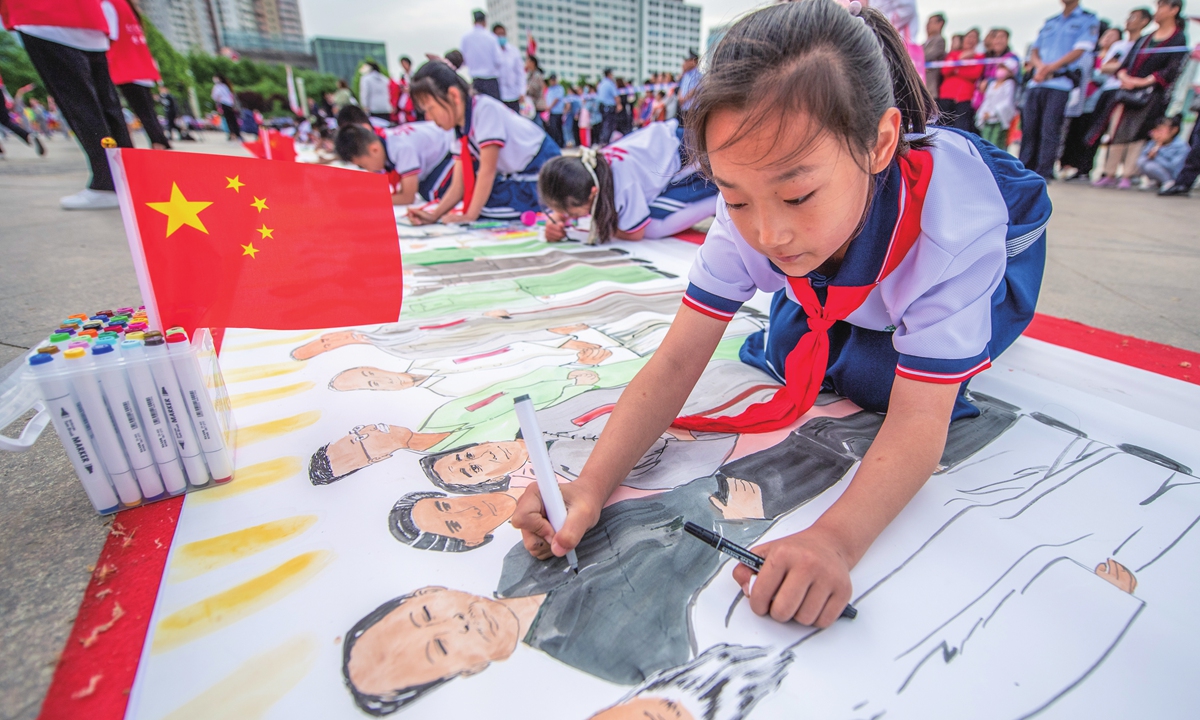
Pupils paint about the history of the CPC on May 23 in Yuncheng, Shanxi Province. Photo: IC
At East China University of Political Science and Law (ECUPL), young LARP lovers spent months in making a LARP game based on a real event in CPC history: The first national congress in 1921 which was initially held in Shanghai but was later transferred to a boat on a lake in Jiaxing, East China's Zhejiang Province, after the then police searched the congress venue in Shanghai.
The main goal of the players of the game is to find out the "traitor(s)" hidden in the then CPC members who secretly shared the location of the Shanghai venue to the enemy, said an administrative staffer surnamed Zhang at ECUPL. During the game, participants wear old-fashioned costumes and act out the roles they play, experiencing the difficulties and hardships of the CPC pioneers in the process of building the Party in an immersive way.
The game was organized six times at ECUPL in April, Zhang said. "It was so popular among our students that each time the quota was reached within minutes online," she told the Global Times. "Many students kept asking us to add more quotas, and to hold more similar LARP games like this."
In the inland Inner Mongolia Autonomous Region, where trendy online and offline games are less popular than in coastal cities like Shanghai though, the young ones also like to learn about CPC history through colorful ways.
At the square of the cultural center in Tuquan county in Hinggan League, Inner Mongolia, many young people often rush to stand at the front of the bleachers to see the performances of different Ulan Muqir art troupes, enthusiastically humming along to catchy songs along with the singers.
Ulan Muqir is the Mongolian name for traveling troupes in Inner Mongolia that travel from one pasture to another, performing for herdsmen who live in some of China's most remote areas.
On the occasion of the 100th anniversary of the founding of the CPC, several Ulan Muqir troupes went deep into the pastoral areas and grassroots communities for cultural exchanges, collecting touching moments experienced by the local people during the century-long development of the CPC and presenting them in the form of songs, dances, operas, and skits.
"What makes me feel happy is to be able to stand at this important point in time to listen to many people's cherished memories and then use my own skills to carry them forward," Dai Shijir, a member of the Ulan Muqir of Tuluan county, told Global Times.
Dai Shijir noted that their team had been touched by the story of a veteran, Tang Jixiang, who had fought in numerous wars since the founding of the CPC, and who left his hometown after the end of the War to Resist US Aggression and Aid Korea ended, spending 26 years to guard the grave of a martyr who had saved his life until his death in 1979.
"Some 20-something herdsmen do not speak Putonghua well, but whenever we sing the song Guarding You wrote for Tang, present the related documentary, they are always moved to tears," Dai Shijir said.
Resonating with main melody
Contrary to unfounded allegations in Western media that depict China as having gone all lengths to "order" its citizens to learn CPC history for ideological control, young people in China today grow up in an inclusive environment and are free to think independently. Like the youth in other countries, they have a natural curiosity and desire to learn about the history of the ruling party in their country.
Many Chinese youth told the Global Times that they gained a new understanding of China and the Party through "connecting" with this grand history, also deciding to become narrators, gradually forming a new force for spreading and exchanging Chinese ideas in various ways.
"Studying the history of the Party gives us a chance to meet the souls of those revolutionists, from whom we can find our own beliefs," Mao Haofu, a docent telling the Party stories at Jinggangshan, told the Global Times.
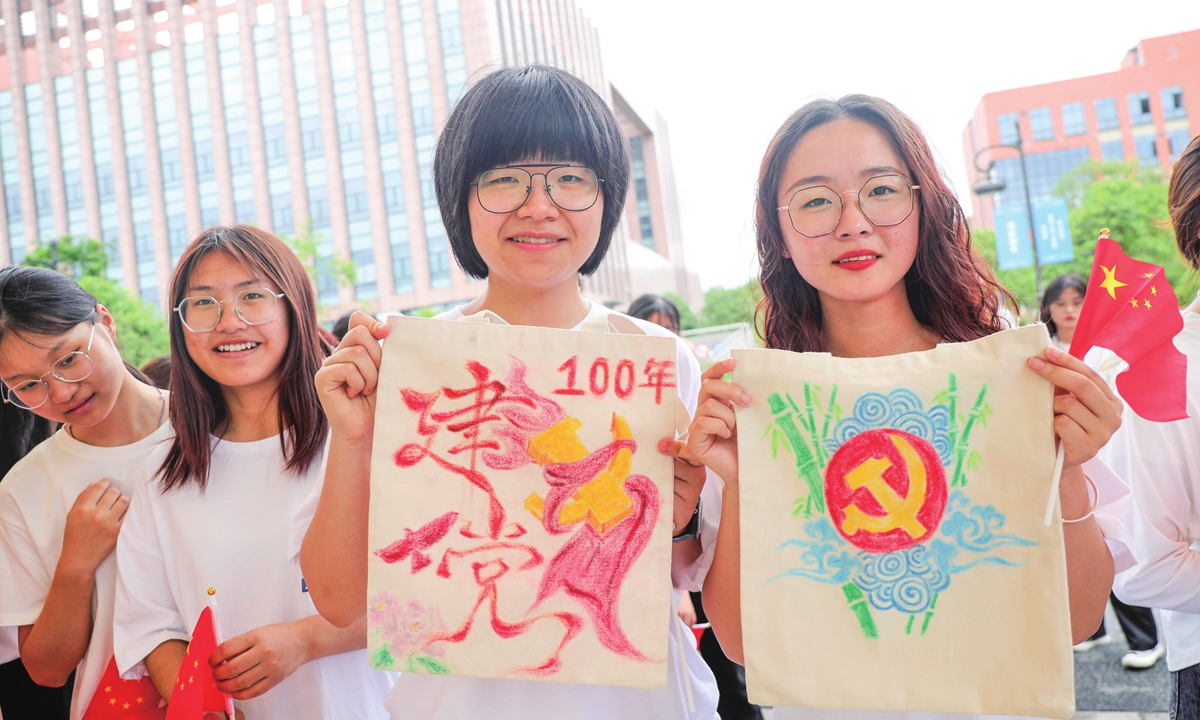
Two college students present the handcrafted bags featuring CPC elements in Hangzhou, Zhejiang Province on May 16. Photo: IC
Mao used to study in the UK. After returning to China, he made a bold decision to quit his well-paying job in the financial industry in the big city to be a docent telling stories about the Party."I always saw many Party history narrators gathered in my hometown, the CPC's first rural revolutionary base. Even though they have different backgrounds, I saw their passion for their work, which deeply impressed me," Mao recalled.
Driven by curiosity, Mao walked into the Jinggangshan Revolution Museum, where he saw a letter written by a Red Army soldier who sacrificed himself at 25 to his wife. The letter written in English says: "Although we trekked every day to fight, our spirit is pleasant, as we are free and we will never let ourselves be oppressed by anyone."
At that moment, Mao seemed to see the real scene in Jinggangshan more than 90 years ago, when many young Chinese people studies all over the world came to Jinggangshan and chose to fight for the future of the Chinese nation.
"In today's China, there are many opportunities and choices for young people too, but we still need such a power of faith to inspire us, so I joined the cause."
Mao also gave full play to his bilingual abilities in telling stories to foreign tourists. "Many Western people do not have a comprehensive understanding of China due to being misled by Western media. They cannot understand how such a big country can operate so efficiently. When communicating with them, I talk about the different national conditions of China in various periods and tell them the role of the CPC in it."
Given that the channels for young people to access information have changed, many video content curators are trying to make a change by posting original videos related to the Party's history on video-sharing platforms.
For example, video uploader Ke seeker (screen name) has collected more than 6,000 hours of video footage and thousands of photos of the Party's history since 1950. On every major festival and anniversary, he will upload his own edited videos of the relevant historical materials on video streaming platform Bilibili, aiming to make a more comprehensive and objective interpretation for netizens.
War on the Sand Table (screen name) has used a 3D map electronic sand table to restore many classic war scenarios in history, vividly reproducing the process of the game played by different sides in the war.
"Faith and trust cannot be forced. China's current young generation is more confident about a CPC-governed China because at the moment they can fully feel the objective fact that China's rapid development is inextricably linked to the leadership of the CPC," Zhang Huifeng, an associate professor at Peking University's School of Marxism, told the Global Times.
Zhang noted that at present, young people's keenness on Party history is not a purpose-oriented or organized indoctrination, but a wave of spontaneous learning. "It is a process in which the voices from the youth and the 'main melody' slowly resonate and reach the chord."
At school, Wei Shuxin, a CPC member and PhD candidate majoring in history of the CPC at Tsinghua University, helped build a CPC history study club with many like-minded young people.
Faced with some Western media maliciously labeling Chinese youth's love and support for the Party as "ignorant loyalty" caused by "brainwashing," Wei responded that studying Party history is not to sing praises but to critically draw lessons from history.
The history of the Party is not a biography of the rulers, but a history of the CPC in uniting the Chinese people to struggle together, in which there have been triumphs, as well as tortuous explorations of bloodshed and sacrifice, Wei said.
"Like most of our peers, the members of our club will not be stingy with our appreciation of the achievements, nor will they avoid discussing and reflecting on the wrong decisions the Party made in the past," Wei added.
"In the past, when China was poor and weak, people were not confident about the development path of their country. At present, a united China is full of cohesion, and learning about history to understand the Party has become mainstream, which also reflects people's identification with the country and the Party," Zhang said.


